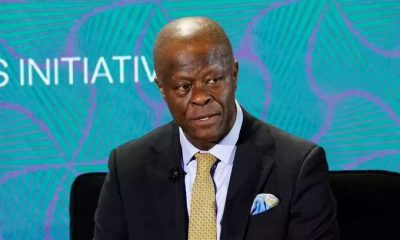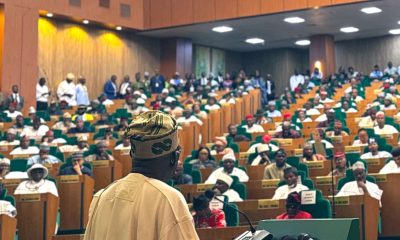Business
State govts owe banks N2.2 trn, N790bn to retirees

By Tumininu Ojelabi Hassan
States governments are groaning over debts, compounded by new wage awards, which federal government hurriedly granted in the wake of the removal of fuel subsidy, as they battle low Internally Generated Revenue (IGR), worsened by the general decline in the economy. Findings revealed that over 21 states in Nigeria owe retirees N790 billion inherited pensions and gratuities. Also, state governments have been said to borrow from banks to pay salaries.
Based on findings, Rivers state and Benue state top the list of states with a backlog of unpaid pensions and gratuities to the tune of N119 billion and N100 billion respectively. The South west zone emerged first with N256 billion while the South south is closely behind with N225 billion.
Meanwhile, only Kebbi and Kaduna states were committed to the payment of pensions and gratuities. About 13 states at the time of this report could not account for and confirm the figure of the debts the states owed their retirees in pensions and gratuities.
The Ondo state government owed over N56 billion in pension and gratuities, which included that of state government and local government. State government arrears run from 2014 till date while the arrears of local government run from 2011 till date.
The situation in Ekiti state is similar as the government owes pensioners about N40 billion in outstanding gratuities from 2014 till date and five months of pension arrears.
Currently, the Ogun state government has an outstanding of N64 billion. Governor Dapo Abiodun inherited N68 billion of gratuities owed to retirees from both state and local governments, however, a payment of N4 billion had been made with a balance of N64 billion inherited debt remaining.
Likewise, the Osun state government owed pensioners N50 billion as at 2022. In Oyo state, unpaid pensions and gratuities running from 2008 till date amount to N43 billion. However, Governor Seyi Makinde paid N10 billion of the debt in compliance with a court order.
In Lagos state, at least, 10,000 retired civil servants are yet to receive their pensions worth over N10 billion. However, the state government has disbursed N52 billion to pensioners from 2019 till date.
The River state government has an accumulated pension arrears of over N119 billion spanning from 2003 to 2023.
Cross River State has unpaid gratuities amounting to N24 billion. Liyel Imoke, the former governor of the state paid until 2012, while his successor, Senator Ben Ayade also paid till 2014. Meanwhile, the present governor of the state, Senator Bassey Otu has shown his commitment to offset the debt before the end of 2023.
The Bayelsa state government has no outstanding amount in pension rights, however, the state owes its retirees gratuities of over N28 billion dating back to 2007.
In Delta state, findings showed that the state owed its retirees over N54 billion pension/gratuities. Recently, the state government facilitated a N40 billion loan on behalf of the Association of Local Government of Nigeria, ALGON, for the payment of accrued benefits of retired local government workers, primary school teachers, and staff of the Local Education Authorities.
The government runs a contributory pension scheme it entered into in 2007. Recall that in November 2022, the immediate past governor of the state, Dr. Ifeanyi Okowa, released the sum of N5 billion for payment of pension arrears to retirees.
The Benue state government has an outstanding debt in pensions and gratuities amounting to over N100 billion. The state government owes local government pensioners 96 months arrears while the state pensioners are being owed 36 months arrears.
Plateau State is up to date in the payment of pensions, but owes over N21 billion in gratuities and death benefits. In the same vein, Bauchi has an outstanding of over N4 billion inherited from previous administrations since 2011, despite offsetting over N4 billion without owing new ones.
Anambra state government owes N10 billion in pensions and gratuities, Abia state retirees are owed 48 months of pension arrears and 30 months of gratuity arrears, which the governor, Dr. Alex Otti, promised to pay and has been paying one month arrears and current salary together since he took in May. While in Adamawa state, pensioners are owed about N4 billion in gratuity and pensions.
In Nasarawa state, both state and local government pensioners are owed over N50 billion. Similarly, Yobe state has an outstanding payment of gratuity amounting to N2 billion.
The figures of the accumulated pension and gratuities inherited from previous administrations in Akwa Ibom, Kwara, Taraba, Borno, Niger, Enugu, Ebonyi, and Imo states have not been ascertained at the time of this report.
Despite the increase in the revenue allocation to the state, states resorted to taking loans from banks. A N540bn increase in the amount shared amongst Federal Government, States and Local Governments Areas was earlier reported.
Following an analysis of the communiqués issued by the Federation Account Allocation Committee between January to July for 2022 and 2023, a total of N4.96tn was shared for the first seven months of 2022, while in 2023, a total of N5.5tn was shared for the first seven months of the year.
Data obtained from the budget implementation report of each state showed that 25 states earned N182.26bn in Q1 2023. This was a shortfall of 3.07 per cent or N5.77bn from the N188.03b made in Q4 2022, based on a quarter-by-quarter analysis.
The figure for IGR was only restricted to 25 states out of the 36 states in the country. The reason being that, Sokoto and Rivers have no data for Q1 2023 yet, Akwa Ibom has no data for Q1 2022, while Lagos, Kaduna, Bauchi, Kwara, Zamfara, Yobe, Ogun and Edo have no data for Q4 2022.
The 25 states estimated N219.56bn IGR for Q1 2023, but they made about N182.26bn indicating a revenue performance of 83.01 percent and the revenue underperformed by 16.99 percent as they failed to meet up with the states’ revenue target.
According to data from the quarterly statistical bulletin of the Central Bank of Nigeria, states and LGAs owed banks about N2.21tn as of March 2023.
Data from the Debt Management Office showed that the 36 states and the Federal Capital Territory have N5.82tn domestic debt and $4.35bn external debt.
In its December 2022 edition of the Nigeria Development Update, the World Bank projected that states’ debts would rise above 200 per cent of the revenue generated in 2022 and 2023.
“Debt levels for an average state are estimated to increase from 154.6 per cent of revenues in 2021 to above 200 per cent of revenues in both 2022 and 2023,” the report stated.
Ezekiel Nya-Etok, a public affairs analyst shared his thoughts on the current debt situation in an interview with Plus TV Africa monitored by our correspondent.
“The reason we have become the poverty capital of the world and why we resort to borrowing is because we have people, who have no understanding of what it is to become a governor or a president in governance. If I had my way, the process should start about two years to election.
“The process should involve due diligence on the candidates. They must undertake a three week intensive course, two weeks online, a week onsite, where one is taught what governance is all about, the essence of governance, what budgeting is all about. They have no understanding of what governance is about. They go in with the pre-conception that there is money in government.
“You must have the mindset to create money, with this mindset, borrowing is not the first option. These questions should be asked. How am I going to go about my IGR? What is my employment portfolio like? In your budget, what is your recurrent? What is your capital? What are salaries and wages?
“When you have this mindset and mentality, you don’t take borrowing as your first option but, unfortunately, we don’t do rigorous pre-qualification profiling, as a result, government go in with the mentality of bring the money and that is why we are where we are today,” he said.
The Fiscal Responsibility Commission (FRC), an agency under the presidency charged with a mandate to promote a transparent and accountable government financial management framework in Nigeria, stated the risks associated with banks lending in a manner that contravenes section 45 of its Fiscal Responsibility Act.
Victor Muruako, the executive chairman of FRC, who spoke at a one-day stakeholders dialogue in Lagos, emphasized that such manners could pose severe consequences for banks and the Nigerian economy. Although borrowing by the government and public institutions is a tool for development, lending by banks and financial institutions in violation of the section 45 of the Fiscal Responsibility Act is unlawful.
He further stated that despite the clarity of the act, banks approve and disburse loans to governments and public institutions without complying with the provisions of the Fiscal Responsibility Act.
“Not once in the commission’s verification exercises has it confirmed that proof of compliance with provision of the FRA was specifically requested for and obtained by a bank or financial institution before lending to any government.
Also, only one, out of a recent sample of 13 loans to governments across the country, had an associated ‘Cost-Benefit Analysis’, detailing the economic and social benefits of the purpose to which the intended borrowing is to be applied,” he said.
“The unsavoury effect of this non-compliance may spread well beyond the individual banks to the inside macroeconomic space,” he added.
The FRA chairman said there are lawsuits in courts across the country challenging the non-compliance to protocol based on the provisions of the FRA 2007 of some bank loans to governments and public institutions.
Concerning the new wage award, states have began deliberations with their labour leaders to determine the plan towards the review of salary.









